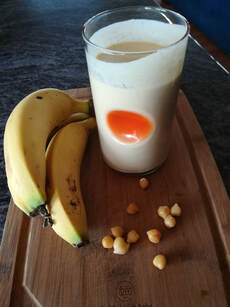|
|
 Did you know chickpeas, also known as garbanzo beans, are one of the oldest and most popularly consumed crops in the world. Chickpeas have been a part of certain traditional diets for over 7,500 years! They belong to the legume family and offer a range of health benefits. Chickpeas help to increase satiety, boost digestion, keep blood sugar levels stable, increase protection against disease and more. In addition they are very high in protein, vitamins and minerals. Chickpeas Nutrition Facts: Just one cup serving of chickpeas contains (in daily recommended values):
They are also quite low in carbohydrates with only 35 grams in a one-cup serving. In addition, they are quite low on the glycemic index which is estimated to be 23. Chickpeas can help benefit your health in the following ways: Helps Control Blood Sugar Levels: Chickpeas, like all legumes, are a form of complex carbohydrate that the body is able to slowly digest and use for energy. Chickpeas contain starch, which is a slow burning carbohydrate that the body does not react to by suddenly spiking glucose in the blood (1). Increases Satiety and Helps with Weight Loss: Chickpeas are high in both protein and fiber, which helps to make you feel full and to curb food cravings and unhealthy snacking. Studies have shown that consuming fiber is correlated with having a lower body weight (3). Chickpeas help you lose weight by making you feel satiated and hence less likely to over snack on healthy or unhealthy junk foods between meals. Improves Digestion Thanks to a High Fiber Content: Chickpeas are very high in fibre with roughly 6-7 grams per half cup serving. Fiber facilitates in healthy digestion by increasing the healthy bacteria in the gut and decreasing the unhealthy bacteria. It also combats constipation which ensures the quick removal of toxins and waste from the body. The high amount of fiber in chickpeas is responsible for making you feel full, aids in heart health, helps to control blood sugar levels, guards against cancer, heart disease, diverticulosis, kidney stones, PMS, obesity, and more. Helps Protect Against Heart Disease and Cancer: Chickpeas have been shown to help balance unhealthy cholesterol levels, to reduce hypertension, and to protect against heart disease. Beans help to keep the arteries clear from plaque build-up, maintain healthy blood pressure levels, and decrease the chances of cardiac arrest and stroke. In fact studies show that having just one daily serving (about 3/4 cup cooked) of beans of any kind can help to decrease chances of a heart attack and to help balance “bad” LDL cholesterol. Consuming beans has also been shown in studies to have protective benefits against cancer, in particular colon cancer, due to their high fiber content (6). In studies, garbanzo beans were demonstrated to stall cancerous cells from further forming (7). Provides Essential Vitamins and Minerals: Chickpeas nutrition boasts high levels of iron, zinc, folate, phosphorus, and B vitamins, all of which are especially important for vegetarians and vegans who may be lacking in these essential nutrients due to avoiding animal products. Folate: is one of the B-vitamins and is needed to make red and white blood cells in the bone marrow, convert carbohydrates into energy, and produce DNA and RNA. Adequate folate intake is extremely important during periods of rapid growth such as pregnancy, infancy, and adolescence. It is also beneficial to athletes. Zinc: this mineral may enhance immune function, stabilize blood sugar levels, and help keep your skin, eyes, and heart healthy. Zinc deficiency can include frequently getting sick with colds, leaky gut syndrome, consistent digestive problems like diarrhea, poor eye health, infertility, thinning hair, and even stunted growth in children. Magnesium, Manganese and Vitamin B6: Chickpeas are loaded with these 3 nutrients which help reduce common symptoms of PMS (pre-menstrual syndrome) and are also vital for athlete’s optimum performance. Protein: Protein plays an important role in nearly every function in the body, from our vital organs, muscles, tissues and even hormone levels. Consuming enough healthy protein helps you to naturally slow ageing, create hemoglobin and important antibodies, to control blood sugar levels, help with muscle building and maintenance, give us lasting energy, fight bacteria, make us feel full, and help to heal wounds and injuries too. Chickpeas have about 15g protein per cup of cooked chickpeas. Those who are most at risk for not consuming enough protein are children, vegans and vegetarians. Protein deficiency can result in muscle weakness, fatigue, low energy, eye problems such as cataracts, heart problems, poor skin health, imbalanced hormone levels and more. Chickpeas are often eaten as a stew cooked with other vegetables or as a dip called hummus, roasted as a crunchy snack or as I have discovered lately the new trend in New York and London are hummus shakes ideal for the whole family for adults, kids, babies and teens ! TIP: When chickpeas are combined with a source of healthy fat, like tahini for example which is the case with hummus, nutrient absorption is further increased.
0 Comments
Leave a Reply. |
AuthorBarbara is a qualified nutritionist offering Health, Nutrition & Lifestyle Counseling. She gives Healthy weight loss advice and promotes the Mediterranean diet. She is the author of the Med Life Diet - creating healthy lifestyle habits and attitudes for life ! Archives
April 2024
|
 RSS Feed
RSS Feed
